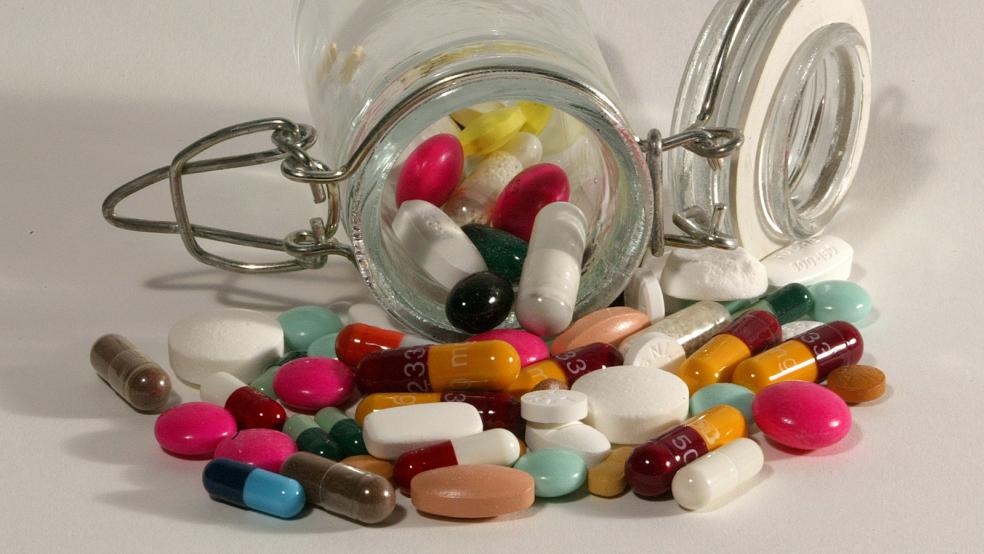Pfizer Inc., the world’s largest drug manufacturer, is no stranger to the growing controversy over price gouging and anti-competitive practices that have drawn sharp criticism from President Trump and prompted calls for government intervention.
Last December, for example, Pfizer and Flynn Pharma Ltd. were hit with record fines totaling more than $110 million in Great Britain after they were found to have conspired to increase prices by as much as 2,600 percent for unbranded versions of the anti-epilepsy drug Epanutin.
Related: How Big Pharma Lobbyists Keep Medicare Drug Prices High
The stunning price increases were quietly imposed five years ago after Pfizer transferred distribution rights to Flynn, which sold the medicine by its generic name, phenytoin sodium, according to a report by Bloomberg.
For a drug manufacturing behemoth like Pfizer with annual revenues of $52.8 billion, a hundred-million-dollar fine is little more than a rounding error and a small cost of doing business.
Ian C. Read, Pfizer’s hard-edged, Scottish-born CEO and chairman, has been unapologetic about his company’s dubious pricing practices. Last week, he gave no ground on the larger question about whether drug prices need to be reined in to protect consumers and taxpayers from rising prescription drug costs at Medicare, Medicaid and the Veterans Affairs Department.
During a speech at the National Press Club, Read delivered an impassioned defense of the drug industry’s pricing practices, while denouncing any effort to impose government price controls as “a bad policy.”
He said that drug prices generally reflect the cost of research and innovation and their “value to society.” Without that research, he said, society would have been denied extraordinary medical breakthroughs in the treatment of cancer, the hepatitis-C and HIV viruses and scores of other often deadly diseases.
Related: Two Big Reasons Prescription Drug Prices Are So Much Higher in the US
President Trump has criticized the drug industry for “getting away with murder” with its pricing practices and has floated a series of proposals, including speeding up the Food and Drug Administration’s review of new drug applications to enhance competition and contain price increases.
Trump has also discussed a change in the law to allow Medicare officials to more aggressively negotiate drug prices and to permit the importation of cheaper drugs from Canada and other countries.
However, Read and other drug industry executives have bridled at most of those suggestions and the Pharmaceutical Research and Manufacturers of America (PhRMA) has mounted a high-priced lobbying campaign to slap down any whiff of government imposed controls.
Read argued that if the drug industry’s return on investment were higher, it might justify more aggressive government intervention to reduce drug prices. “But you must understand: Our focus is, What’s the value of the drug? Can we recover a portion of that value? And how much can the company extract in profits after negotiating with insurers, health care providers, and drug distribution middle-men?”
Related: Drug Prices Are Soaring: Here’s Why You May Not Get the Meds You Need
“That’s how we price,” he said, adding later that “This industry needs a return that allows it to continue to do its research.”
The Deloitte Center for Health Solutions in the U.S. and the United Kingdom concluded in its latest analysis last year that the pharmaceutical industry “continues to face regulatory and reimbursement hurdles weighing on the research and development (R&D) returns of pharmaceutical firms.
Based on a review of the estimated returns of 12 leading biopharma companies and comparing their performance with four mid-to-large-cap companies, the study found that annual projected PhRMA returns continued to decline to 3.7 percent, while the long-term costs related to bringing a product to market remained at roughly $1.5 billion.
While he vigorously endorses President Trump’s call for a speed up in the Food and Drug Administration’s review of new drug applications, which often can take years to complete, Read was dismissive of any other government intervention in drug pricing.
Related: Trump Moves Quickly on Pledge to Contain Drug Prices – but Can He Do It?
He argued, for instance, that drug importation would be very dangerous to patients. “It would really affect patients’ safety” since Canadian officials don’t regulate drugs being sent out of the country.” Read dismissed the “other stuff” being proposed by reformers as “a grain in the sand.”
“Unless we get the incentives right, we won’t be able to fix health care,” he said. “I don’t believe that price controls of any part of the system” leads to innovation.
Read made a similar argument during a speech earlier this year at the World Economic Forum in Davos, Switzerland. "One way of lowering health-care costs is to have more innovation and more competition," he said. “So pay more for medicine so we can develop more good medicine, so we can drive, through competition, lower costs."
Pfizer has never been shy about raising prices, even while other companies recently have begun to self-impose annual price increases of less than 10 percent in response to political pressure.
Last June, for instance, Pfizer increased the list prices of its prescription drugs in the U.S. by an average of 8.8 percent, according to an investor note by Morgan Stanley analyst David Risinger. In January of that year, Pfizer raised prices by an average of 10.4 percent.





